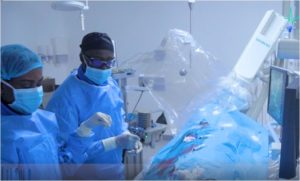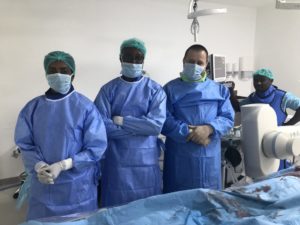 Since founding the Ghana Society of Interventional Radiologists in November 2015, Benjamin Dabo Sarkodie has been working to establish the offering of minimally invasive, image-guided procedures in the west African nation. He describes his recent successes performing the first cerebral aneurysm coiling in West Africa, and discusses how, through collaboration with interventionalists from Hungary, he is setting his sights on hyper-acute stroke management as the next frontier in Ghanaian interventional radiology.
Since founding the Ghana Society of Interventional Radiologists in November 2015, Benjamin Dabo Sarkodie has been working to establish the offering of minimally invasive, image-guided procedures in the west African nation. He describes his recent successes performing the first cerebral aneurysm coiling in West Africa, and discusses how, through collaboration with interventionalists from Hungary, he is setting his sights on hyper-acute stroke management as the next frontier in Ghanaian interventional radiology.
Ghana is a developing country located in West Africa, bordered by Ivory Coast, Togo, Burkina Faso, and the Atlantic Ocean, with a growing population of 30 million people. Although endovascular neurointerventional practices are well-established in many developed countries, they are non-existent in many low- and middle-income countries, due to a shortage of doctors with the required training, and to limited infrastructure. This is despite the huge demand. Until recently, there were minimal treatment options in Ghana for neurovascular conditions such as arteriovenous malformation (AVM) or cerebral aneurysms. Many patients travel thousands of miles to access treatment, an expensive venture that some patients are not fit for. Indeed, several developed complications like deep vein thrombosis during these long haul, transatlantic flights.
The infrastructure needed for this specialty is not readily available in Ghana. The establishment of a neurointerventional service is also hindered by the lack of good quality angiographic machines and trained angiographic laboratory personnel. However, adequate resources are emerging.
In March 2019, supported by interventional radiologist Istvan Lazar (Borsod County University Teaching Hospital, Miskolc, Hungary), we successfully completed the first case—to our knowledge—of cerebral aneurysm coiling in West Africa. This was after the acquisition of a digital subtraction angiogram (DSA) and road mapping software at the Euracare Advanced Diagnostics and Heart Center in the Ghanaian capital, Accra. We continue to collaborate with Lazar for assistance with difficult cases. Our team is comprised of doctors, nurses, and radiographers who have been adequately trained to assist with these endovascular neurointerventions.
Since this first case, we have successfully completed six cases of coiling and one case of flow diverter stent insertion. We have also undertaken 22 cases of diagnostic cerebral angiograms, two cases of tumour embolization, and three cases of AVM embolization.

With the good outcomes from these initial procedures, coupled with awareness creation, we are set to embark on even more endovascular neurointerventions.
It is an exciting time for healthcare in Ghana, as we are now equipped to cater for both ruptured and unruptured cerebral aneurysms, as well as other neurovascular conditions.
With the launch of a stroke centre at Euracare, hyper-acute stroke management is our next major focus. We have acquired various devices to aid us in offering mechanical thrombectomy to people with large vessel ischaemic infarcts.
As all patients are evaluated by a neurologist prior to intervention, a strong partnership with other specialties, such as neurology, neurosurgery, and anaesthesia, is needed as the basis for these procedures.
As we forge ahead with our endovascular offering, we hope that the surgical options for treating some of these conditions will also become more readily available. These will serve as an alternative modality, in addition to treating those conditions unsuitable for endovascular management.
We are also embarking on conferences and workshops, backed by the Ghana Society of Interventional Radiologists, to aid physicians in identifying common conditions like subarachnoid haemorrhage. There is a low level of awareness among general practitioners, who serve as the first point of call.
To provide an example of this: a client of mine had been on admission for a week in a small facility receiving treatment for malaria. She had been suffering from severe headaches and suddenly collapsed whilst singing at church. Fortunately for her, the pastor presiding over the assembly thought it prudent to request a transfer to a tertiary facility, as her condition was not improving. A head CT scan was requested on admission to the facility: the diagnosis, an acute subarachnoid haemorrhage.
Many patients are not able to afford these interventions, as treatment is on a “cash and carry” basis. Local insurance companies, as well as the National Health Insurance Scheme, do not offer cover for these procedures. However, an altruistic cerebral aneurysm survivor has founded the Ghana Brain Aneurysm Foundation, which aims to fund and make accessible treatments to those who are not as fortune as he was to receive management abroad.
Benjamin Dabo Sarkodie is a consultant endovascular and interventional radiologist in the department of Radiology at the School of Medicine and Dentistry, University of Ghana, Legon, Accra, Ghana.









